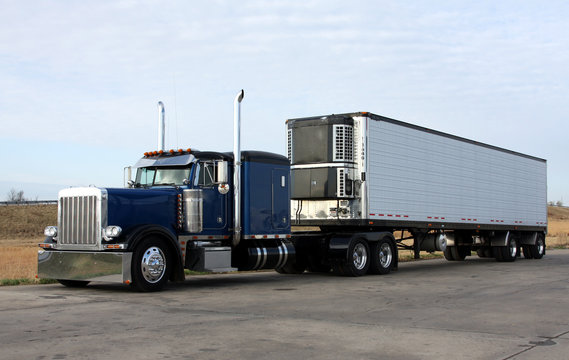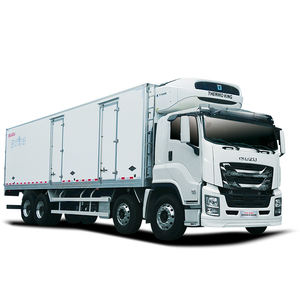Leading Advancements in Transportation Refrigeration: Enhancing Efficiency and Security
The landscape of transport refrigeration is undergoing significant improvement, driven by innovations intended at boosting both effectiveness and security. As these developments continue to advance, it is important to explore their effects on operational practices and regulatory compliance, prompting a better examination of just how they reshape the future of transportation refrigeration.
Smart Temperature Level Keeping Track Of Systems
In the world of transport refrigeration, wise temperature tracking systems have actually become a critical advancement for guaranteeing the stability of temperature-sensitive items. These innovative systems leverage Net of Things (IoT) innovation to provide real-time information on temperature level fluctuations, making it possible for drivers to maintain ideal conditions throughout the supply chain. By continually tracking the temperature of refrigerated containers and lorries, companies can quickly recognize discrepancies that might jeopardize product top quality.

In addition, smart tracking systems frequently incorporate automated informs and alerts, allowing stakeholders to react quickly to any type of potential concerns. This positive approach not only lessens the risk of perishing yet additionally enhances compliance with governing criteria governing food safety and security and pharmaceutical transportation.
The integration of information analytics within these systems additionally promotes anticipating upkeep, aiding operators to visualize prospective tools failures before they happen. This capacity minimizes downtime and maximizes operational performance, eventually leading to cost savings.
Eco-Friendly Refrigerants
Smart temperature level tracking systems play a crucial role in keeping item quality, but the effectiveness of transport refrigeration likewise hinges on the option of refrigerants utilized. In comparison, emerging choices like hydrocarbon-based refrigerants and hydrofluoroolefins (HFOs) existing reduced GWP options, offering both performance and sustainability.
These environmentally friendly refrigerants not only decrease environmental effect yet additionally straighten with worldwide guidelines focused on phasing out unsafe materials. Their fostering can bring about improved power effectiveness, ultimately minimizing operating expense for transportation refrigeration systems. Moreover, the usage of all-natural refrigerants, such as ammonia and co2, has acquired grip due to their excellent thermodynamic homes and lower ecological footprint.
Buying environmentally friendly refrigerants is not simply a governing conformity measure; it stands for a critical choice that enhances brand name credibility and fosters consumer loyalty. thermo king transport refrigeration. By focusing on sustainable methods, business can add to a greener future while ensuring the integrity of transferred goods
Advanced Insulation Materials
Utilizing advanced insulation materials is critical for maximizing transport refrigeration systems, as they considerably enhance power effectiveness and maintain consistent temperature level control. Traditional insulation methods commonly fall brief in protecting against thermal transfer, resulting in boosted energy consumption and changing temperatures within cooled compartments.
Arising materials such as vacuum cleaner protected panels (VIPs) and aerogels use superior thermal resistance, enabling thinner accounts without compromising efficiency. VIPs, for instance, utilize a vacuum layer to lessen conductive and convective heat transfer, making them ideal for space-constrained applications. Aerogels, understood for their permeable and light-weight framework, provide phenomenal insulation while dramatically decreasing general system weight.
Furthermore, incorporating stage change products (PCMs) right into insulation systems can additionally stabilize temperature levels throughout transit. These products soak up and launch thermal power, properly buffering versus external temperature variations.
The combination of these innovative insulation products not just decreases the operational costs connected with power usage but likewise extends the service life of temperature-sensitive items. As image source the transport refrigeration industry remains to evolve, the fostering of ingenious insulation innovations will be essential in boosting both effectiveness and safety and security in cooled transportation.
Automated Path Optimization
The performance of transportation refrigeration systems is substantially boosted through automated route optimization, which leverages real-time information and innovative algorithms to establish one of the most effective courses for delivery. By evaluating different variables such as web traffic patterns, look at this website climate condition, and distribution windows, these systems can significantly decrease traveling time and fuel intake.
Automated course optimization reduces human mistake and subjective decision-making, which can bring about inadequacies. This modern technology allows fleet supervisors to assign sources more properly, guaranteeing that refrigerated goods keep their called for temperature throughout the journey. By enhancing courses, business can also enhance consumer fulfillment via prompt distributions.
In addition, automated systems can adjust to unpredicted scenarios, such as road closures or sudden website traffic spikes, enabling dynamic rerouting. This versatility not just protects the stability of temperature-sensitive products but additionally adds to overall functional effectiveness.
Carrying out automated path optimization can lead to considerable cost savings while lowering the carbon impact related to transport. As services significantly prioritize sustainability, this innovation sticks out as an important component in contemporary transportation refrigeration, aligning functional goals with environmental responsibility. Inevitably, automated route optimization represents a considerable advancement in the pursuit for effectiveness and security in transportation refrigeration.

Real-Time Data Analytics
Automated route optimization substantially take advantage of the integration of real-time data analytics, which supplies crucial understandings into the performance of transportation refrigeration systems. By using real-time data, transport drivers can monitor temperature changes and devices performance, guaranteeing that perishable products are maintained within needed criteria throughout transit. This aggressive strategy not only boosts the top quality of the delivered items but likewise reduces the risk of putridity and loss.

In addition to boosting efficiency, real-time analytics improves security by ensuring conformity with regulatory standards for temperature control. This not only shields public health and wellness but additionally strengthens a company's online reputation - refrigerated transportation thermo king. As the transport refrigeration industry progresses, the integration of real-time information analytics becomes a keystone for driving development, sustainability, and operational excellence
Verdict
To conclude, the innovations in transportation refrigeration Related Site substantially enhance both efficiency and safety within the market. Smart temperature level monitoring systems and real-time information analytics supply important oversight, while eco-friendly refrigerants and advanced insulation products add to sustainability and power efficiency. Moreover, automated route optimization algorithms not only lower traveling time but likewise reduce environmental influence. Collectively, these developments represent an essential evolution in transport refrigeration, guaranteeing compliance with regulatory criteria and promoting a greener future.
The landscape of transport refrigeration is undertaking considerable transformation, driven by advancements aimed at enhancing both efficiency and safety and security.Smart temperature level tracking systems play an essential role in preserving product high quality, but the efficiency of transport refrigeration also pivots on the selection of cooling agents used. Their fostering can lead to boosted energy performance, ultimately lowering operating costs for transport refrigeration systems. Ultimately, automated course optimization stands for a significant development in the mission for efficiency and security in transportation refrigeration.
In verdict, the advancements in transportation refrigeration significantly boost both effectiveness and safety within the industry.